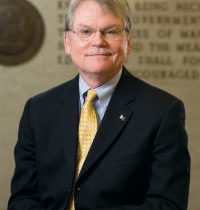Magazine

Renewing Our Vows
When married couples celebrate a milestone anniversary, they sometimes decide to renew their wedding vows in public.
These ceremonies are moving because the couples reach into their shared past to project their future.
If we were to do the same thing at the University’s 200th anniversary, we might reflect on some of the following “vows” from deep in our past:
We teach school.
From the day in 1841 when seven students arrived at the University in Ann Arbor, until last fall when that number was 44,718, the overriding purpose for the existence of this University has been teaching students. At a time when there are so many more points of contact with the University—athletics, health care, purchasing and construction, etc.—it is important to reiterate that core purpose.
We seek the truth.
When President Henry Tappan declared in his 1852 inaugural address that Michigan had to become a “real” university, he made the search for the truth through research central to the mission of the University, where it has been ever since. Whereas, he argued, “colleges” simply pass on received wisdom, universities, through their research and teaching, push the boundaries of the known and the true.
We offend our own stakeholders from time to time.
It was the genial and longest-serving president in the history of the University, James B. Angell, who shocked the state in 1871 when he declared that attendance at protestant chapel services at the University, heretofore required of all students, would now be voluntary. Shortly thereafter, controversies over faculty teaching evolution and “radical” political economy confirmed the view of some that the University had become a menace to accepted values. In some ways it was—and always has been—because there is an essential tension between the rates of discovery of new truths and values inside the University and outside of it.
We strive to be the best community we can be, but we have not always succeeded.
In authorizing the admission of women in 1870, the Board of Regents declared that any person “who possesses the requisite literary and moral qualifications” could attend the University. This important phrase prevented individual discrimination in admissions based on race and religion at a time when many prestigious universities were doing just that.
And yet…the dormitories were not fully racially integrated until after World War II, women could not walk in the front door of the Michigan Union unaccompanied by a man until 1956, and racial and religious discrimination by fraternities and sororities would continue long after the University’s first tepid anti-discrimination ordinance in 1959. When people sometimes ask why the conversation about diversity is so important these days, it is simply because we have not always gotten it right in the past and we believe that, if we talk about it, we can do better in the present.
We will remain the “leaders and best” for the next 200 years by “renewing our vows” to place the search for the truth in the center of all we do, to teach the methods and findings of that truth to our students, to follow that search wherever it leads even if, at times, it leads to unpopular places, and to be the most diverse, welcoming, and inclusive community we can be.
